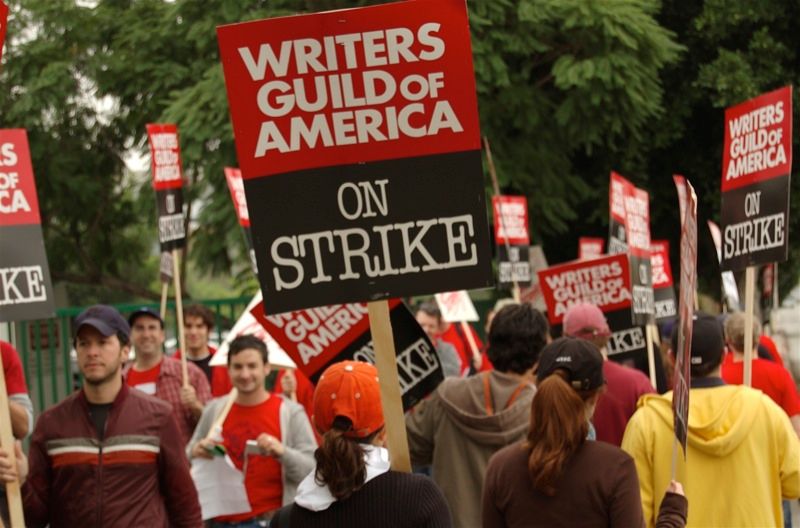From support staff to senior-level, TV writers look back at how the strike changed them.
This week the Writers Guild of America ratified its new contract with the Alliance of Motion Picture and Television Producers, marking an official end to the historic labor action that sent TV and film writers to the picket lines for five long months. The strike exposed the cartoonish greed and outright cruelty of Hollywood studio executives, who illegally trimmed sidewalk trees to deprive picketers of shade and at one point threatened to drag out the strike until writers lost their homes. These war-of-attrition tactics were ultimately at their own expense. The contract ratified this week represents a massive victory for WGA members, with gains in minimum staffing, streaming revenues, the use of artificial intelligence, and other key areas of concern for the WGA, making writers an estimated $233 million more per year compared to the previous contract. “They didn't just lose,” comedian and writer Emily Heller told me. “We won. And we won big.”
For all the strike revealed about the amorality of Hollywood’s multi-millionaire CEOs, it also revealed the power of the workers who brought them to heel: the writers, of course, but also their colleagues throughout the entertainment industry, from the Teamsters and IATSE members who refused to cross their picket lines, to the SAG-AFTRA members who joined them in July and are still on strike today, to the workers in other industries who went on strike this summer, many of whom showed up on the WGA’s picket lines and vice versa. For many, this was their first labor action; for others, it was the latest in a series of battles against a perennial foe, one whose power has only grown more sinister as conglomerates become mega-conglomerates and tech companies funnel workers’ money into their own coffers by transforming entire professions into gig work. For all of them, it was the beginning of a new chapter in Hollywood, the dawn of a post-Peak TV era that has only begun to reveal itself—and which they will now have a more powerful hand in shaping.
“Strikes change people,” Erik Baker wrote in Jewish Currents last month, in a piece arguing for the use of strikes as "engines of political transformation," a way of building movements rather than a last resort in difficult negotiations:
They allow workers to experience, at least temporarily, a total overturning of the normal order of the workplace, a space unburdened by the countless ordinary coercions built into the structure of the capitalist labor process. On the picket line everything seems possible. This experience of collective freedom breaks through the resignation to necessity enjoined, in different ways, by both union bureaucrats and corporate bosses.
There will be much written about the 2023 WGA strike in the weeks and years to come. Only time will tell its lasting effects on an industry in flux, one whose future depends on much broader political currents—antitrust enforcement, tech regulation, labor reform, who wins in 2024—not to mention the broader union fever transforming our country. In the immediate aftermath of victory, though, I’ve been wondering: how do writers feel the last five months changed them? What did they learn out on the picket lines; where did their cynicism turn into hope and where didn't it? What seems possible to them now?
I reached out to a handful of WGA members and pre-WGA writers with these and other questions, hoping to give you a quick piece showcasing their reflections on the strike. I received more responses than I anticipated, from people who were very generous with their answers. Rather than give you a massive 7,000-word newsletter that gets cut off by your email provider, I’m going to spread their thoughts across a couple pieces, beginning with this one.
Below you’ll find reflections from writers Julie Greiner, Brenden Gallagher, Ronald Metellus, Emily Heller, Johnathan Appel, Alison Golub, and Gina Ippolito. Stay tuned later this week to hear from Megan Amram, Caitie Delaney, Ariel Dumas, Rusteen Honardoost, Liz Hynes, Will Landman, and Ceda Xiong. (And possibly others… please get in touch if you’d like.) I’d like to thank everyone who took the time to share their thoughts with me; there’s a lot to chew on here, whether you’re an entertainment industry worker or simply a humble entertainment consumer. I hope you enjoy reading.
Julie Greiner: "We have to be of two minds."
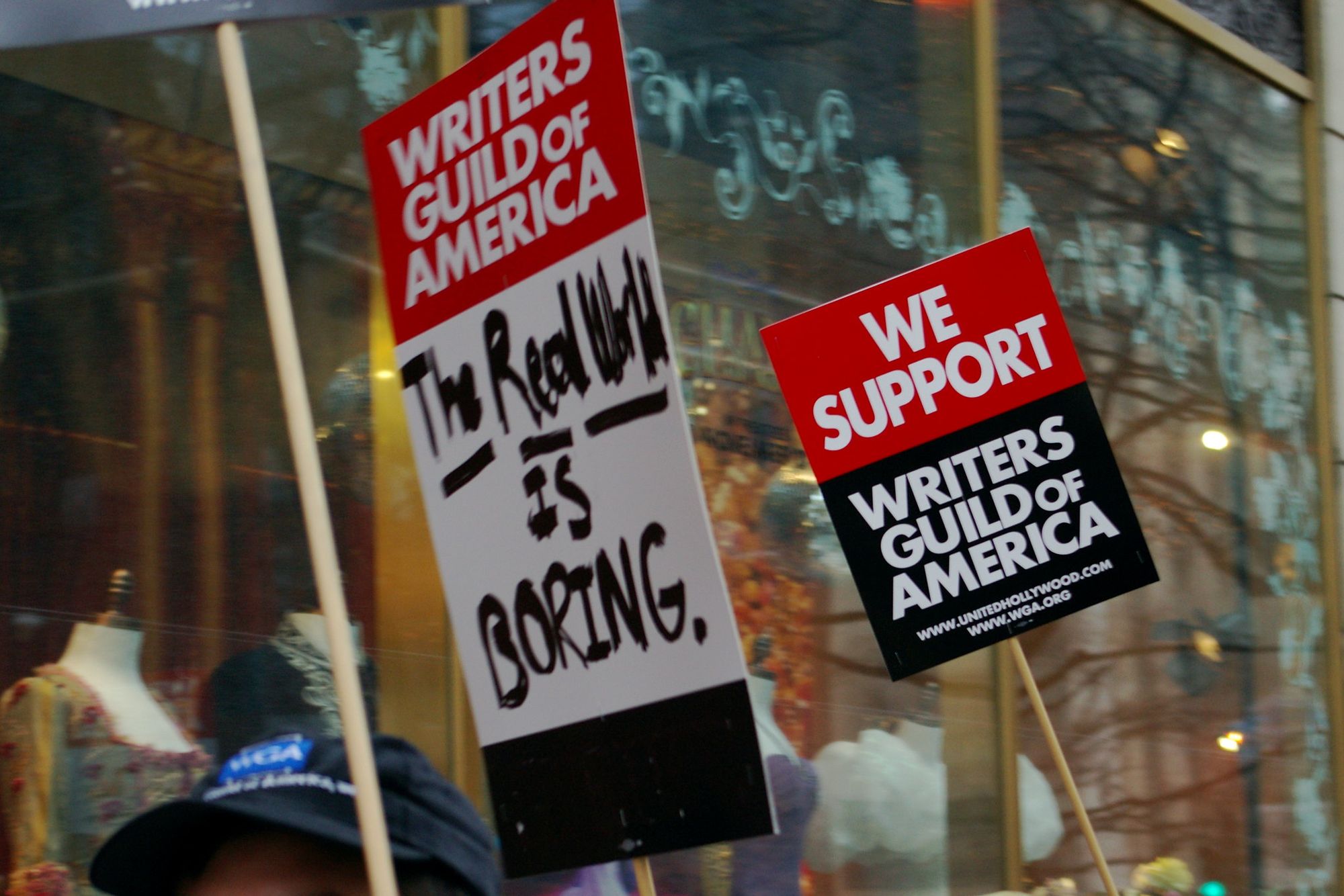
I think for me, and for many in this industry, the end of this strike has been a confusing thing. We have to be of two minds.
On the positive side, I think most of us believe the deal we got was genuinely great. Our negotiating committee fought hard and held out for an MBA that has the potential to change this industry for the better in many crucial ways. I walked alongside other writers I had never met for five months and over 500 miles, giving me a feeling of solidarity and community I have never felt before in a career that has been entirely remote (at least for me) ever since the pandemic.
Our strike also demonstrated that union power is an imperfect but effective tool against a lot of the forces of corporate greed that have, in the past, felt inevitable or unstoppable. I hope that we use this momentum to amplify other labor causes in upcoming years—the thought of that collective power is thrilling. I love writers, I love writing, I love unions—that has been my predominant and overwhelming feeling for months!
Companies count on our fear of admitting what we're going through.
But… then there's the negative. I would say I entered this strike cynical about our industry, and the AMPTP did not challenge that view at all—in fact, they deepened it at every opportunity, and with every horrible quote in the press. Writers must continue to be transparent with each other about their experiences even after we are not physically walking alongside each other telling stories every day, because companies count on our fear of admitting what we're going through or our uncertainty about whether our circumstances are the norm to screw us over, and I doubt that will change even when we have a new, better contract in place.
Additionally, fighting (and winning) a war with the AMPTP sadly doesn't eliminate all of the rot in our industry. In a WGA meeting after the deal was struck, some writers brought up the incredibly crucial points that, even in the wake of a historic deal, our own members are still the ones that make a lot of the hiring decisions or lead writers' rooms, and that oftentimes we were walking the picket lines with the very people who had made our experiences in the industry hellish. The strike made it easy (and even necessary) to adopt an us-versus-them mindset where the AMPTP was the only villain, but in a post-strike world, we must remember that we are responsible for calling out and rooting out issues everywhere we see them. Including amongst our own!
Brenden Gallagher: "We have the strength and power."
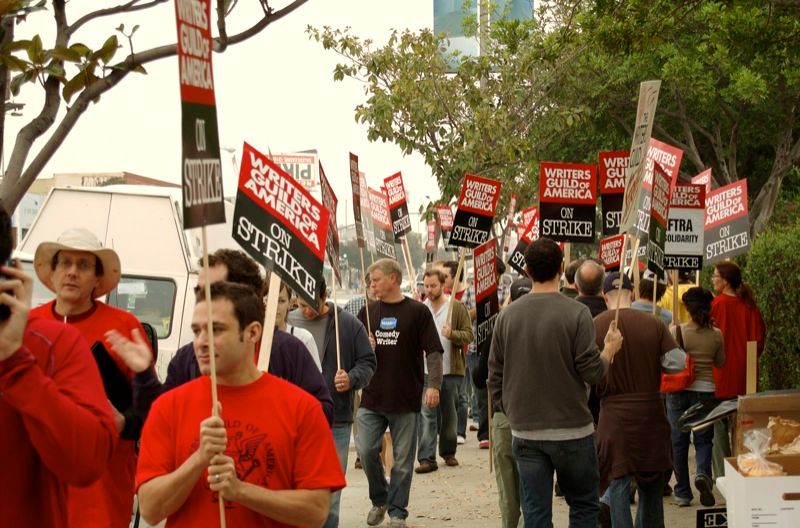
For me, the strike was about putting my money (or my feet) where my mouth is. I have been a DSA member since Bernie lost in 2016. I have had the pleasure of working on other labor and political efforts, but this is the first one that impacted me so directly. To see the work that DSA and other unions have put into building labor solidarity in Los Angeles pay dividends in a way that benefited me was truly humbling: the public was with us completely from day one. To see DSA-LA come through with so much support for the strike through their Hollywood Labor Sub-Committee was really amazing to see.
On the first day of the strike, Adam Conover joked to me that when the WGA line was “nobody wants to strike, but we have to,” I was the only one who actively wanted to. Joking aside, while striking is hard on everyone and some people felt real pain, strong unions strike and without a credible threat of a strike, unions cannot win. The WGA proved that we have strength and power despite the changing business at the hands of big tech. And we won. Solidarity forever.
Ronald Metellus: "Any mistreatment that had happened to me had happened to someone else."
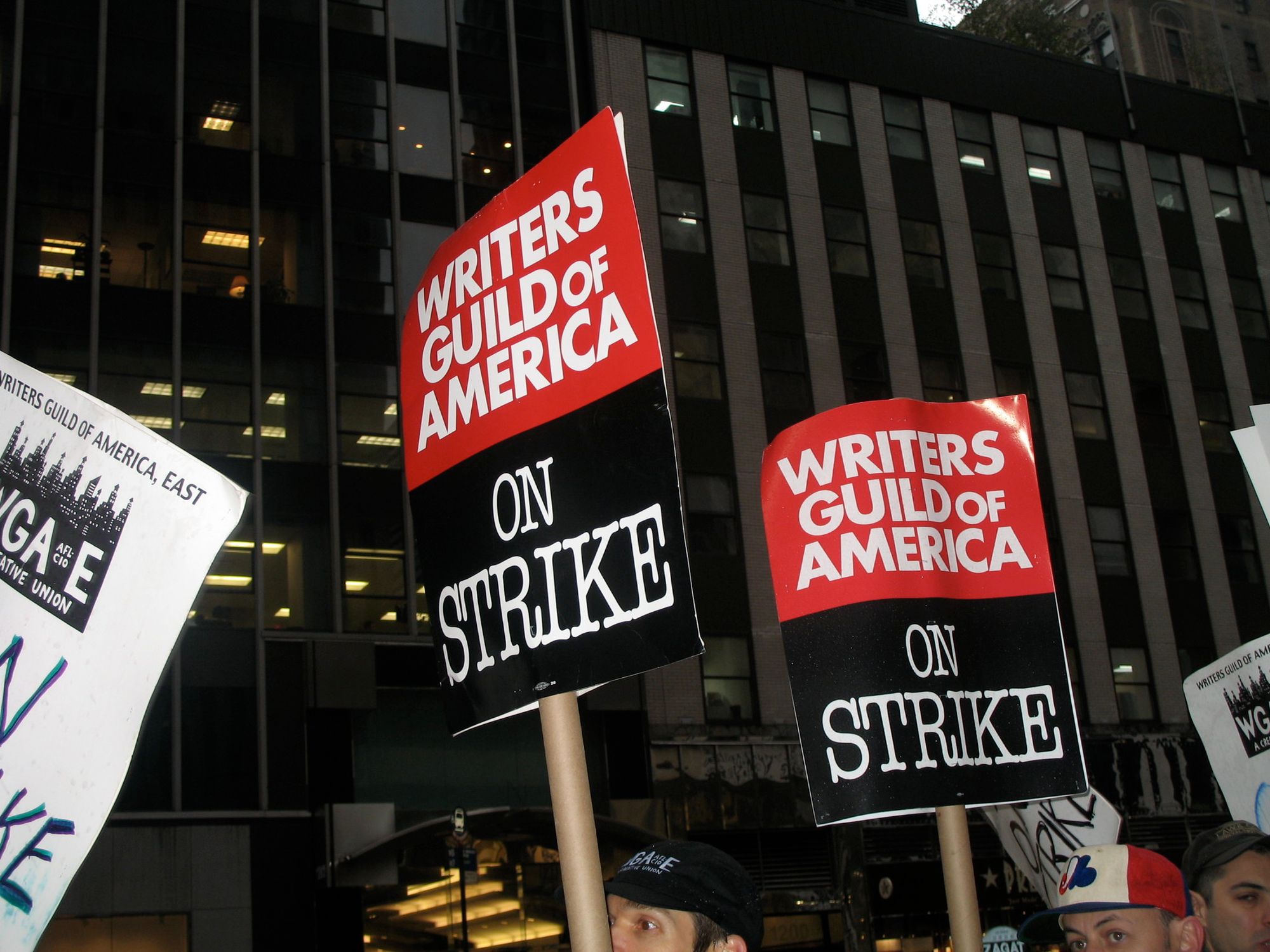
The strike taught me the extent to which we're exploited. On one of my first days on the picket lines I met a writer who, along with his writing partner, had worked to adapt a novel into a feature for two years. The production company they were working with lost the rights to the book and that was that. Two years of almost entirely free labor amounting to nothing. Any mistreatment that had happened to me had happened to someone else on the lines.
The intra-union solidarity presented the most utopian image of the strike. Watching Teamster drivers refuse to cross the picket line and essentially starve out productions was heartening.
I'm hopeful now that we won't be completely replaced by AI in the next three years. I'm cynical about quite a bit: as someone who’s worked in 12-writer rooms and 5-writer rooms, I can say pretty confidently that 5 writers is not enough writers. As such, the staffing minimum doesn't sufficiently address mini-rooms. Three writers is a mini-room.
One moment that will stick with me is the town hall meeting in Los Angeles on the first week of the strike, where all the LA labor union heads voiced their support for the guild. Solidarity can be a religious experience.
Emily Heller: "It was so, so stupid for the AMPTP to give us five months to compare notes."
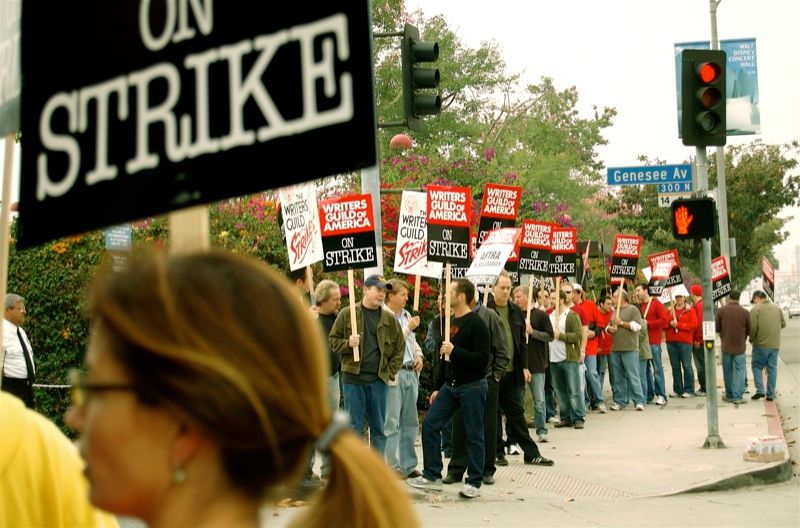
Over the last decade or so in America, we've all kind of watched in horror as the obvious Worst Option won out again and again in various arenas of public life, even when we all seemingly knew better and theoretically should be able to stop it. Insert whatever thing most traumatized you here, but for almost all of them, corporate greed has put a pretty heavy thumb on the scales toward making things worse. Going into these negotiations, I thought: on the one hand, we have the precedent of the WGA strikes pretty much always being successful. On the other hand, we have the precedent of everything else that has happened in the last decade. I was hopeful, but I also acknowledged the possibility that our entire industry was about to implode for no good reason at the hands of some short-sighted CEOs. It feels really, really good to break that Worst Option pattern. They didn't just lose—we won. And we won big.
Another paradigm shift for me: as long as you stayed away from the comments section on Deadline, it was clear we had the support of the public. That really surprised and delighted me. The inner workings of Hollywood are pretty opaque to the outside world, and we're often told that our complaints are all champagne problems, but this time around, people outside of Hollywood still recognized that our bosses are the same as their bosses. Everyone is being squeezed and everyone is sick of it. There seems to be a wider attitude shift right now that I'm hopeful will snowball. People are losing the delusion that they're all going to be billionaires and that they're better off having class solidarity with other workers. We didn't start it, but as one of the most visible and powerful labor unions in the country, I do think it helps other labor unions to see us win.
The strike shifted my career priorities, too. I've spent the last few years developing my own shows, even though as a writer who's climbed the ladder in the last decade, I've missed out on some of the crucial learning experiences that would prepare me to be an effective showrunner. Now that we've won back the guarantees of having writers on set, I'm more eager to go back to staffing on someone else's show and get that experience.
A lot of the gripes I've had in the last five years or so that I've chalked up to being a fluke or my own bad luck, I found out were industry-wide issues. It's not just me!
I cannot emphasize this enough: it was so, so stupid for the AMPTP to give us five months to compare notes with each other for hours a day. A lot of the gripes I've had in the last five years or so that I've chalked up to being a fluke or my own bad luck, I found out were industry-wide issues. It's not just me! Lots of other talented, experienced writers have been shuffled around low paying mini-rooms, struggled to get staffed on shows because of slashed budgets, and had projects passed on because corporate mergers have shifted a network's mandate in the time between them buying your pitch and you turning in the script.
There are specific jobs where I've been told "they couldn't hire you, because they had to hire someone 'diverse.'" (An abominable thing to tell someone, because for one thing, stop trying to pit us against people of color; for another thing, a single person can't be “diverse.") But then I'd be on the picket lines chatting with queer women of color who are also at my level in the industry and I'd find out, guess what? They ALSO didn't get that job. I'm not losing out on opportunities because of diversity initiatives. I'm losing out on opportunities because studios are pinching pennies. They're hiring fewer writers, and they're withholding title bumps from entry level writers to keep them from climbing the ladder.
I can remember the moment when I realized the AMPTP had well and truly lost the PR battle. It was shortly after the tree-trimming fiasco at Universal. I got a message from my pen pal, who is incarcerated in Texas—a state that's regularly under investigation for its inhumane prison conditions, including heat-related deaths. She wrote: "I saw the article about them trimming the trees at Universal Studios. So juvenile and petty. I hope they get in trouble for that stunt." I thought, holy hell. Obviously, our struggles as writers are not even remotely comparable to what she goes through. But even prisoners are hearing about what the studios are doing and saying, "That's fucked up." It's that little extra cruelty that made it that much easier for people to pick a side.
Johnathan Appel: "You're lucky to have our labor."
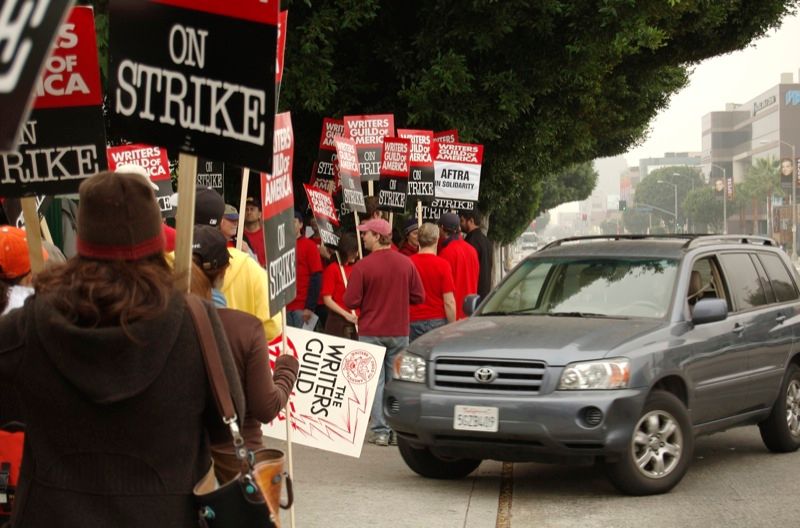
In the first two months of the strike, I was on a picket line (or was on it earlier in the day) when we shut down the filming of Billions half a dozen or more times. It ruled. We shut down a show that was literally about the billionaire class, through our collective action.
Management and CEOs have been able to convince labor that we are lucky that they deigned to hire us. I’ve felt that way for the decade I’ve been in the workforce and even before that. It’s not just the creative industry where that is explicitly said, either; it’s every single segment of labor that is currently on strike. Our society implicitly says, “You’re lucky to have a job, any job, and feed yourself and your family.” But this strike, and the wider labor movement, have let me know that we have power when we know the truth and say, “No, you’re lucky to have our labor.”
A lot of writers and actors on the line talked about how they were striking not for themselves but for the next generation. That is the very corny truth. The dividends of these strikes will be that the writing profession can continue.
Alison Golub: "Hot Strike Summer brought my hope back."
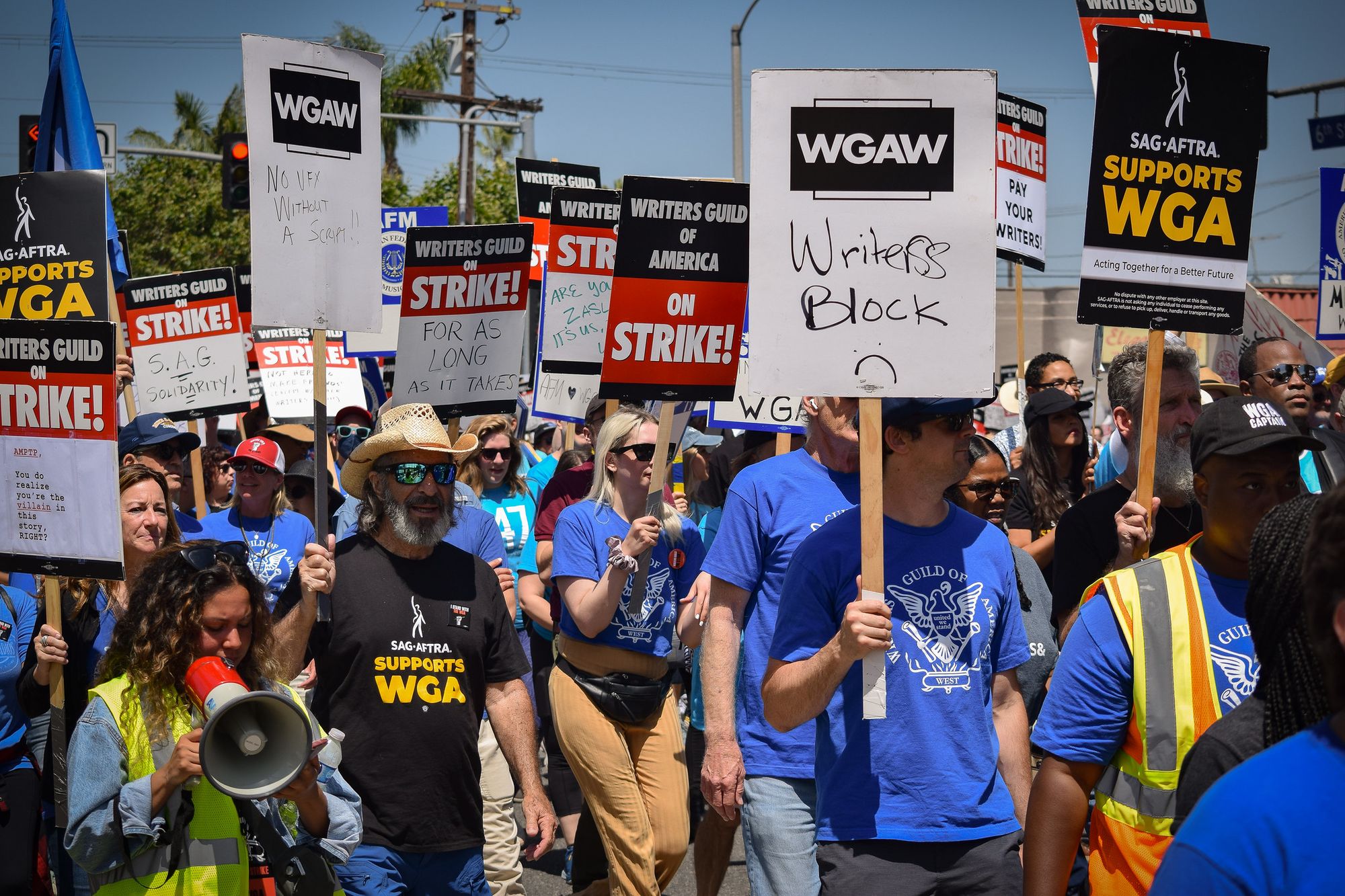
I’ve half-joked for a while now that I hadn’t felt hope for the future of the United States since Super Tuesday 2020. But Hot Strike Summer brought my hope back. The solidarity and support for not just the WGA and SAG strikes, but for UPS teamsters, Unite Here, and UAW, just to mention a few, has warmed my heart to see. Seeing how many people donated to Hollywood Labor’s Snacklist fundraiser and volunteered for our Snackpack delivery program, seeing how many people sponsored programs like Dean’s Coffee and donated to mutual aid funds like the Green Envelope Grocery Fund—all of that was such a pleasant surprise. It feels like there’s finally a real labor movement in this country again.
I hope the entertainment industry takes the lessons we’ve learned this summer to heart. The CEOs are the ones that need us—it is our labor that makes them profits and we more than deserve a fair share. Workers in all industries deserve more—and it’s long past time we start demanding it. If this summer has proved anything, it’s that we are in fact stronger together. Let’s not forget that.
Gina Ippolito: "I'm hopeful that the workers of every industry can make themselves heard."
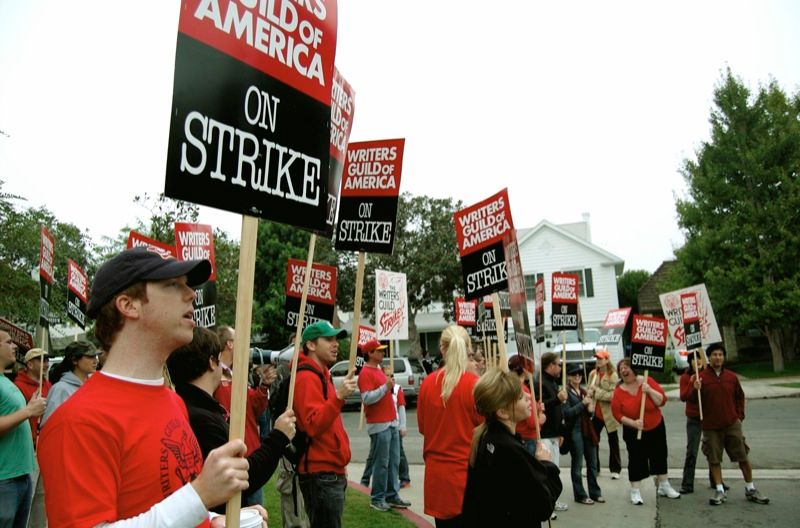
Before, whenever there was a strike, whether in my industry or in another, I'd wonder if the workers would get what they were asking for and what they deserved. This time, it was so clear from day one that we were going to succeed. It was the first time that I realized what a union can do if almost all of the membership is united against a common foe. I never doubted that we'd win, I just wasn't sure when we would.
While I was confident that the membership would be united, I wasn't sure if the general public would be behind us. I was worried there would be misinformation about how "all writers are wealthy elites living in mansions with water fixtures, personal chefs, and someone to sort through all the skittles to remove the yellow ones." It turns out, if your leadership is eloquent, transparent, and educated, it's possible to fight misinformation in real time and rally everyone to your side, the side of the worker, the side that's right. I'm hopeful that the workers of every industry can make themselves heard in terms of what's been going on for the past few years—CEO salaries increasing while worker salaries stagnate. I think that that's something the public can get behind.
As far as what I'm still cynical about, there will always be people on social media acting in bad faith when it comes to discussing what's going on. There will always be people who are determined to bury their heads in the sand, ignore the facts, and side with management. These are the people who no amount of education will make them change their minds. They are determined to be contrarian. That's just the nature of social media as it is now.
My Dad passed away early last year. He had leukemia, and when he was sick, he would lay in bed and watch the same episodes of Resident Alien over and over and over again, just cracking up at the same lines and moments every time. During the strike, one of the themed pickets was a Resident Alien Day. I was able to go and tell the creators and actors how much the show meant to my Dad before he died. They were all so kind and gracious, and I know that my Dad, a first-gen American, a public school teacher, and an avid pro-union guy, would have loved everything about that day, and this fight.
Header image via Eric Appel/Flickr.
